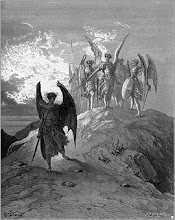Tuesday, April 14, 2009
Sunday, April 5, 2009
autobiographica, 1 Nephi 1.2

where we've been:
Nephi's parents were rich, which afforded him advanced educational opportunities.
where we are and where we're going:
Before the Da Vinci Code begins we are informed that "all descriptions of artwork, architecture, documents, and secret rituals in this novel are accurate." would it have been so popular without such a bold truth claim to start with? We can (almost) say in all honesty that it would not have been as precisely popular (maybe more, maybe less, but I'm guessing less) as it is or was without its provocative introduction. Joseph Goebbels famously said "If you tell a lie big enough and keep repeating it, people will eventually come to believe it." The Da Vinci Code is less accurate or true with respect to the secret organizations that it references than its preamble may have lead us to believe (according to one thing I read once on the internet somewhere, my scholarship is almost as good as what I'm accusing Dan Brown of here). I'm not saying that the BoM is the greatest fraud to be perpetrated on the American continent. That accusation has been levelled several times through the years. I'm not looking to lend my voice to that chorus.
What I am saying is that claims of the magnitude that we're talking about always tend to attract an audience. The BoM goes much further than the Da Vinci Code ever did and the results have been nothing short of controversial. People want to know is it real? Could it be real? It's comforting to think that there's something bigger than us out there. The central conceit (I use this term loosely) of the Book of Mormon is that there is a God, his name is Jesus, and he's got contacts all over the earth, sometimes they even write about him. This is the Latter-Day Saints reply to perhaps the most important question ever asked: Is there God?
Skeptics would have us believe otherwise, Scottish philosopher David Hume offered this rhetorical series of questions as an answer: "Is [God] willing to prevent evil, but not able? then is he impotent. Is he able, but not willing? then is he malevolent. Is he both able and willing? whence then is he evil?" casting doubt on the benevolent Deity concept all together. Nephi acknowledges that the whole God thing is a mysterious enterprise. But he's here for us, ready to unravel some of that mystery. Point number one I suppose is that there is no correlation between being favoured of God and avoiding suffering (As the Buddha reminds us, as if we could forget "life is suffering"). We are assured that this account is true that it is not a work of fiction and that it will elucidate the true nature of God. Imagine a religion where their sacred text consisted of one question and one answer. Is God real? Yes! Things just aren't that simple. How can you have a God without metaphysics? I'm sure there will be plenty on offer here. So, the journey begins in a very simple way, a rich boy, Nephi, writing in his journal about his life, which will teach us, according to the author, about God. Teach on teacher.
Saturday, April 4, 2009
dear diary, Nephi 1.1
This is like tearing out my own nails with a rusty pair of pliers, or it could be that I'm just in a bad mood. I haven't even started and I'm already burnt out. Where was I...
When you meet someone for the first time it's polite to introduce yourself. Apparently barbaric ancient societies weren't above this obligatory kindness. Nephi gets us started with something in this vain and proceeds to tell his life story. Brace yourself. The whys, the hows and the what fors are all accounted for in the first few verses. It's probably helpful to remember that the book was not written in verses originally, as a point of fact, neither was it written in English, the soup of the day was reformed Egyptian. Don't get me started (prepare yourself for a post about this lost language very soon).
Who was this Nephi and what gave him the right to go around making up his own languages? Well, if we cheat and skip ahead we find that Nephi was the son of a well-to-do "visionary" man, who had a joyous surplus of gold, silver and precious things stashed away. A popular children's song in the LDS faith proudly proclaims that we like Nephi of old are "born of goodly parents." I have a feeling that the song is assessing the moral character of his (and our) parents and not their financial status, while I'm almost certain that the former is what Nephi had in mind when he carved out his freshly concocted characters on metal sheets. This embarrassment of riches allowed for an education in the "learning of his father", which included, but was not limited to "the learning of the Jews and the language of the Egyptians", confirming the truism that free education only occurs in Europe. Given the extra time afforded by being uber rich, with a dearth of drugs, TV, and other less than constructive recreational options, I too would probably make up a lot of stuff and/or write in my journal.
More tomorrow. If you're lucky and I'm good...
Labels:
Book of Mormon,
Nephi,
reformed Egyptian
Subscribe to:
Comments (Atom)



